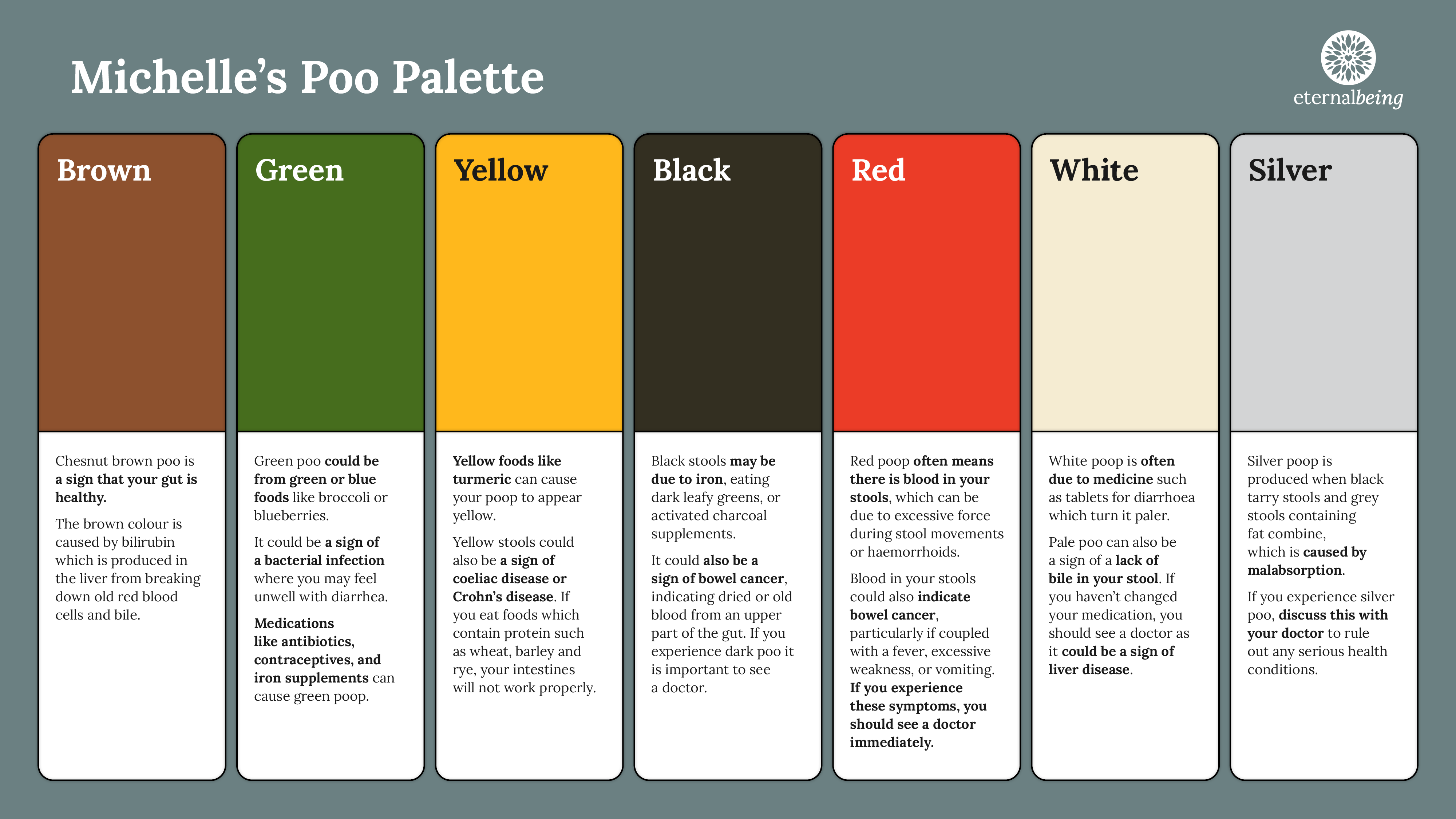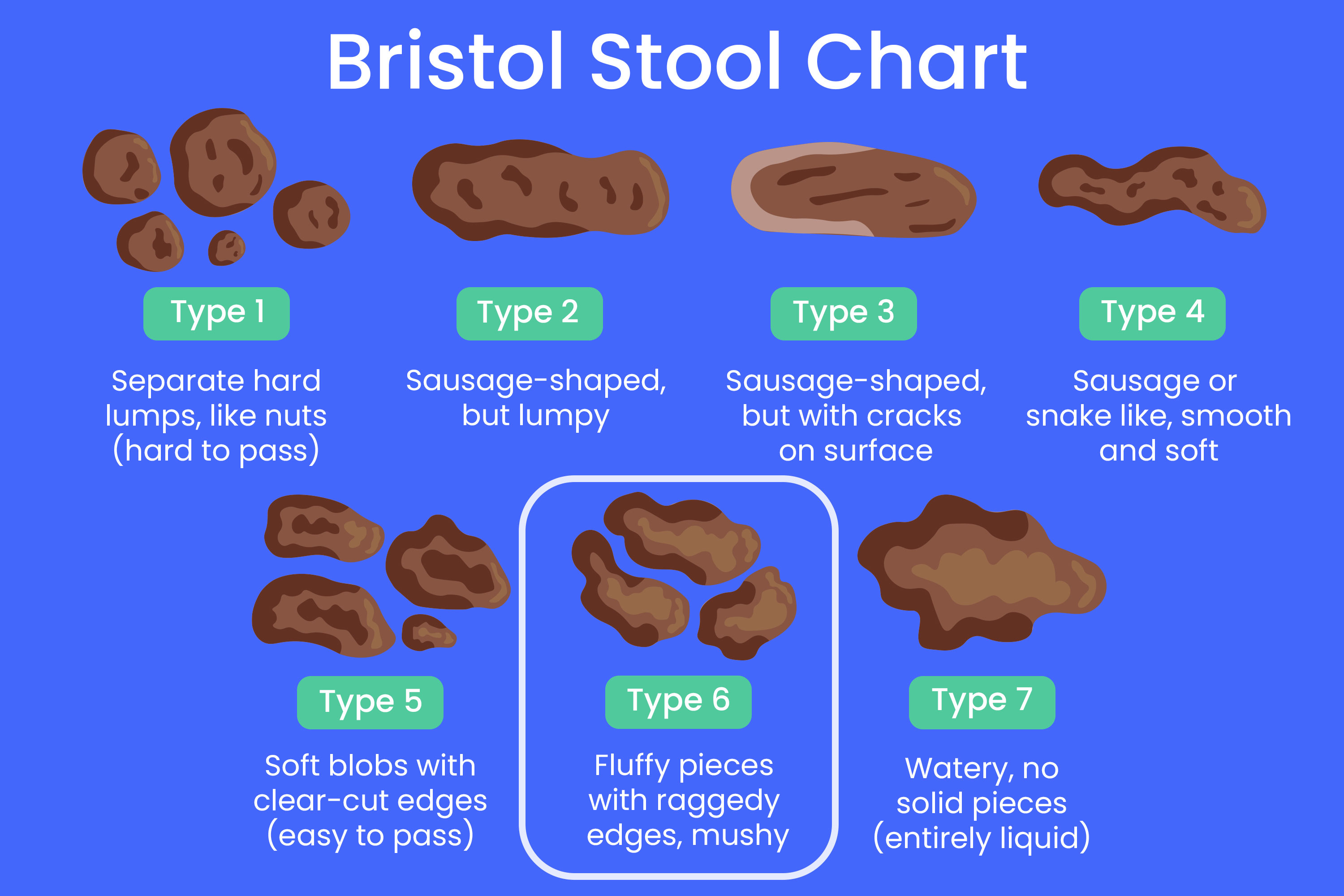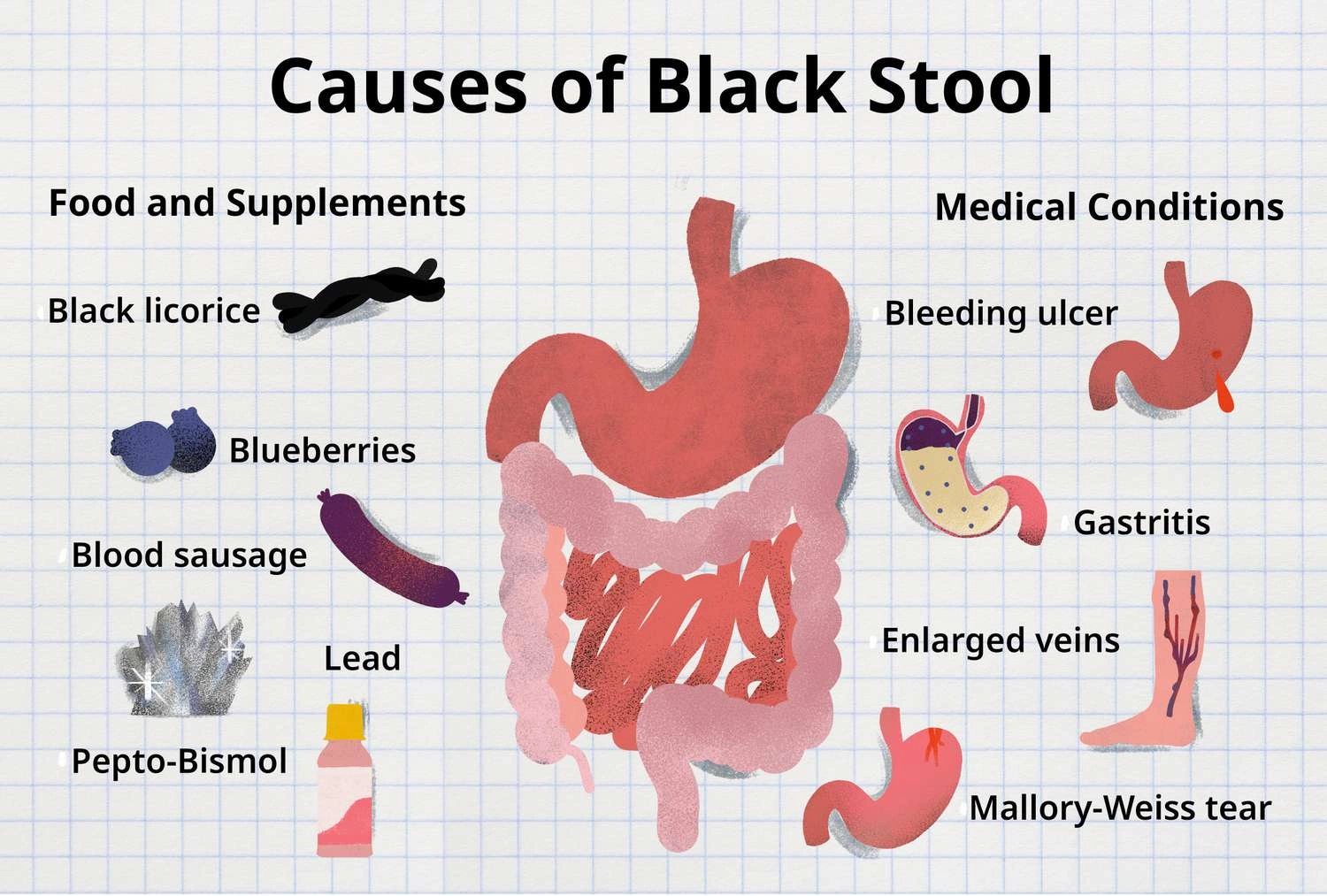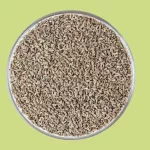
Surprise in the Bathroom?
Okay, real talk: Have you ever gotten a little shock when you glanced down after “going,” only to see your poop is…way darker than normal? Maybe you tried to play it cool. Maybe you called your best friend in a panic (been there!). Or maybe you did the classic—grab your phone, Google seriously—but then got ten different answers that made you even more confused.
Let’s just say you’re not alone. What causes dark poop in adults? The answer can be as harmless as the food you ate last night (blackberry smoothie, anyone?), or…sometimes it means your body’s waving a red flag. That’s what we’re digging into here. With a friendly nudge, plenty of stories, and some science—no lectures (promise). Ready?
Food Fails, Fiber, and Freak Outs
Did You Eat Something…Weird?
Let’s start with the easy stuff. You’d be amazed at how quickly what goes in comes out—sometimes with surprises in color! Honestly, half the time, dark poop is just your lunch showing off. I once spent a weekend at a blueberry-picking festival and thought I’d turned into a medical mystery. Nope—just antioxidants doing their job (and making things, uh, dramatic).
Foods that can turn your poop into a shadowy masterpiece include:
- Blueberries and blackberries (blame those pigments!)
- Black licorice
- Beets (sometimes they trick you with purplish-red, but still…)
- Blood sausage (hey, I don’t judge your brunch choices)
And let’s not forget certain food dyes, or even a dark chocolate cake binge—admit it, you’ve done it. If you’ve gone wild on the color wheel, chances are your poop will reflect that for a day or so. If you’re ever unsure, check out these pictures of black poop in adults—it’s kind of like Instagram for your insides (less glamorous…more useful).
Supplements, Meds, and Your “Helpful” Habits
So, maybe it wasn’t the midnight snack. Are you taking anything for your health lately—extra iron for energy, or that pink bottle you reach for when your stomach’s off?
Turns out, lots of common remedies can cause dark (sometimes straight-up black) stool:
| Supplements/Medications | How They Work | Typical Duration |
|---|---|---|
| Iron supplements | Iron binds with stool, turning it really dark (even black) | Usually as long as you’re taking them |
| Pepto-Bismol (or any bismuth meds) | Bismuth reacts with sulfur in your gut, causing a black color | Just while it’s in your system |
| Activated charcoal | Absorbs stuff in your gut, dyes everything deep black | Short-term, usually after use |
Honestly, iron trip-ups are classic. I once started a new supplement and got so freaked out, I almost called my doctor at 2 a.m. Good news: totally normal. Not fun to explain, but normal. If you’re ever in doubt, though, don’t just rely on this table—check with an actual pro.
Quick side note:
If your poop is dark but there’s no obvious blood, check out what experts say about black stool without blood—it’ll help you separate the “meh” from the must-call-the-doctor stuff.
Sometimes It’s Not “Just” Food
When Your Gut Is Trying to Say Something
Alright, let’s get serious for a second. Sometimes, dark or black poop isn’t just because you’re a wild berry lover or an iron warrior. It can be your gut’s version of an SOS.
If your stool looks like tar (sticky, dark, even smells strong and weird), it could be what the pros call “melena.” This is usually a sign that there’s bleeding somewhere up high—like your stomach or the start of your small intestine. The blood gets broken down as it travels, which…yeah, makes it black and stinky (research on GI bleeding by Healthline).
What’s Causing This, Anyway?
So, you might be wondering: What causes dark poop in adults like this? Here’s where the science and stories meet:
- Peptic ulcers: These are sores inside your stomach or the start of your small intestine. They can bleed without warning (especially if you’re popping a lot of pain pills or stress-eating spicy food).
- Gastritis: Basically, your stomach lining gets inflamed, often from alcohol, too much coffee, or even certain bacteria.
- Varices: Swollen veins in your esophagus or stomach, sometimes from liver issues. They can pop and bleed (seriously, not just in medical dramas!).
- Esophagitis or a little tear: Forceful vomiting can actually tear things up, and your body will let you know—in more ways than one.
- Even certain cancers: It’s rare… but possible (no need to panic, but don’t tune out either).
A friend of mine ignored his black, weird-smelling poop for weeks—thought it was “just stress.” It wasn’t. Doc caught an ulcer before it caused real drama. The bottom line: Listen to your gut (literally) and check in with a pro if something feels off.

Confused by All This?
Here’s a simple comparison for you:
| Cause | What It Looks Like | How It Feels | What To Do |
|---|---|---|---|
| Food/meds (harmless) | Dark but not sticky, usually after certain meals or supplements | No extra symptoms, maybe mild constipation | Wait a day or two, watch for changes |
| Potential bleeding (urgent) | Black, tarry, sticky, strong odor | May have pain, nausea, dizziness, paleness | Call your doctor ASAP |
Worried it’s not blood? Want actual visuals? Check out these pictures of black poop in adults—sometimes seeing is believing (and less scary than guessing).
So, When Should You Panic?
When Dark Poop Means “Doctor, Now!”
Let’s be clear. Not every bathroom surprise is an emergency. But…there are definite red flags you should never ignore. If you see dark poop with any of the following, don’t wait:
- Serious dizziness or feeling faint (especially if it won’t go away)
- Stomach pain, vomiting (especially if it looks like coffee grounds—gross, but important!)
- Shortness of breath, racing heartbeat
- Tiredness that’s new or severe
- Or… if the changes just keep happening and aren’t linked to obvious foods or meds
I know, nobody likes running to the doctor for “bathroom stuff.” But your gut is actually smart— it gives you early warning signs. Trust it. Peace of mind is better than a WebMD spiral at midnight.
Still Not Sure?
If your poop is black but you know you haven’t eaten anything weird, and there’s no blood you can actually see? Go check out advice about black stool without blood. Sometimes, things that look scary aren’t as dramatic as your anxiety brain would have you believe.
Your Normal, My Normal…What’s Actually Normal?
When Color Changes Happen
The truth? Poop color isn’t the same for everyone. Healthy stool usually ranges from medium to dark brown. A little green? Probably dinner moving fast, not a problem. Randomly lighter or paler? That can happen with antacids or some meds (see Healthgrades’ guide on stool color changes).
But… black, tarry, sticky stool—especially if you didn’t just eat a pint of blackberries—calls for some attention.
What If Things Shift a Lot?
Notice sudden, persistent changes in your “bathroom routine”? Never be embarrassed to track them. (On my phone I literally have a note called “Gut Drama”—TMI, but it helps if you ever need to talk to a doctor.) Even a quick pic with your phone can help a healthcare pro figure out what’s up (promise, they’ve seen it all!).
How Long Should You Wait?
Generally, if you ate a ton of dark foods or started iron recently, give it two or three days. If it’s still dark—and especially if other weird symptoms show up? That’s not the time for stubbornness. Your body’s asking for backup.
Small Habits, Big Gut Wins
Keep Tabs On What Goes In—And Out
Sometimes I get so busy I forget what I ate yesterday. So if you’re seeing dark stool, ask yourself: Did your diet change? Started a new vitamin? Handy tip: Keep a tiny food log on your phone for a week. You’d be stunned at how quickly patterns jump out.
And hey, while you’re at it, use pictures of black poop in adults if you’re genuinely unsure (no shame—it’s science, not oversharing, right?).
Gut Check: When to Get Help
Gut drama can be embarrassing, but trust me, every doctor has stories that top yours. If you’ve got that weird, sticky, black stool (melena, as the pros say), real pain, or you’re just plain anxious—reach out. For those of you who love over-researching, peep more on black stool without blood for the non-scary scenarios. The info is there, use it.

Final Thoughts—Listening to Your Gut, Literally
So, what causes dark poop in adults? Sometimes it’s food (blueberries, I see you). Other times, it’s supplements, pink medicine, or a wonky meal. But don’t ignore your gut’s whispers if things stick around, especially with other symptoms tagging along.
Your body’s always sending you signals—it’s just up to us to listen, notice patterns, and ask for help if things feel off. Most of the time, one random bathroom surprise isn’t a big deal…but your “normal” is worth protecting. Tell a friend if you’re worried, check some expert links (yep, like black stool without blood or real pictures of black poop in adults), and—most of all—have your own back.
Your gut knows you best—listen, stay curious, and take action if you need to. Here’s to fewer surprises behind the bathroom door…and more confidence about what’s normal, and what’s not. Stay well—and keep checking in with yourself. You deserve it. Now, who’s got a less dramatic food story to swap?


















Leave a Reply
You must be logged in to post a comment.